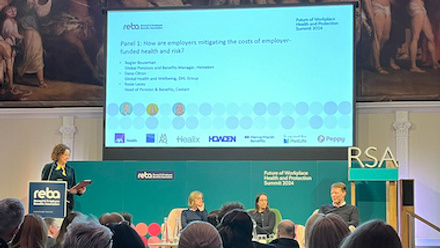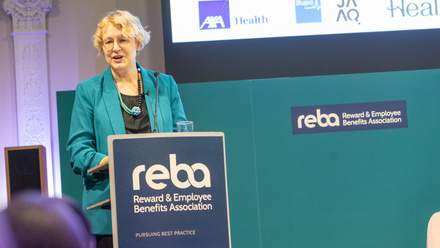Five crucial pandemic-related questions to ask your insurer

1. What digital health support do you offer?
Never has it been more important to be able to access health support virtually. So, not surprisingly, the pandemic has accelerated the use of healthcare ‘tech’. This comes with several benefits.
In a pandemic, it reduces the risk of infection. In normal times, it saves travel costs, travel time and reduces carbon footprint.
Services include digital GP apps, online employee assistance programmes and wellbeing apps, which help employees engage with lifestyle objectives, such as fitness, sleep and nutrition. Digital health services can make a big difference in employee wellbeing, as well as improving employee engagement with your overall benefits package.
2. What support is available to help me tackle key issues arising from the pandemic?
Aviva’s Age of Ambiguity research saw an increase in the number of employees experiencing mental health difficulties since the pandemic. And, with more employees working from make-shift home offices, it’s likely that many employees will require musculoskeletal support.
Ideally, your insurer should offer ‘clinical pathways’ that enable employees to rapidly access personalised support both virtually and face-to-face where required. Typically, this type of service enables employees to get treatment without the need to see their own GP. Instead, they’re put in touch with a clinical expert for an assessment and then given a treatment plan based on their individual needs.
Rather than adopting a one-size-fits-all approach, the use of clinically led pathways enables a more personal approach by offering your employees the support that’s known to be the most effective in treating their symptoms. Moreover, it can also help prevent absenteeism, improve recovery and increase return to work rates.
3. How are you helping to keep my employees safe?
Although accessibility to treatment is important, the safety of your employees is paramount. So, you should also consider asking your insurer about the clinical controls they have in place. For example, have they reviewed each provider's Covid-19 operational processes to assure themselves that appropriate protocols are being followed to provide treatment in a safe environment?
This safety-first philosophy shouldn’t just be driven by the pandemic. It’s important that this ethos underpins all clinical decisions the insurer makes – suppliers should be specially selected based on their ability to provide quality treatment with demonstrable clinical outcomes, in a safe environment. The focus shouldn’t be on the volume of specialists or facilities on a hospital list. You need to be confident that the insurer can guide customers to the right supplier for their individual needs. In turn they’ll help drive more value from your healthcare benefit.
4. What do you offer employees affected by Covid-19?
The key issue with employees who’ve contracted Covid-19 is that the condition can have a long-term physical and psychological impact on health. While private medical insurance can help diagnose the root cause of the problem, added value benefits and the rehabilitation support that come with group protection can help once the chronic condition has been diagnosed. Employees who suffer from ‘long’ Covid-19 could also benefit from wellbeing services, outlined next.
5. What support do you offer to protect my workforce in the future?
It’s often said that prevention is better than the cure. And that’s where the insurance industry offers a wide range of wellbeing services which sit neatly alongside contractual insurance cover.
From insurer to insurer, wellbeing packages are different, but they can play an important role in bringing employees fast, easy to access medical professionals and expert support. Some include services such as nutritional consultation, exercise tips and mental wellbeing programmes.
With the right company culture and behaviours, your line managers can help drive wellbeing initiatives, while Mental Health First Aiders can be trained to identify issues and offer support. As part of an insurance package, exercise-related staff benefits also fit in well with wellbeing initiatives. This could help with some of the Covid-19 risk factors, such as obesity and diabetes.
There’s no one-size-fits-all approach, so understanding the unique needs of your workforce is essential. However, by asking your insurer the right questions you’ll be more confident that your benefits meet the changing needs of your employees during the pandemic and beyond.
The author is Dr Subashini M. associate medical director at Aviva UK Health and Protection.
This article is provided by Aviva UK Health and Protection.
In partnership with Aviva
Our purpose is to be with you today, for a better tomorrow.







